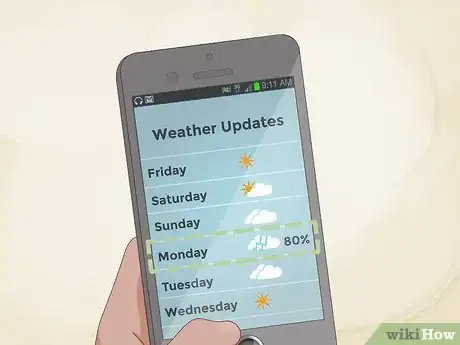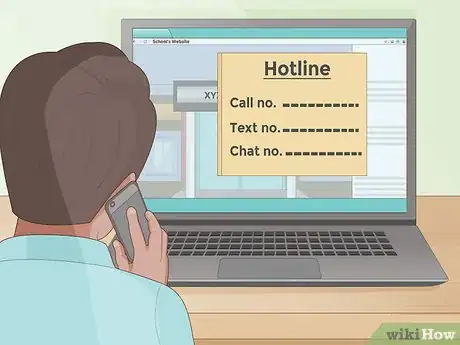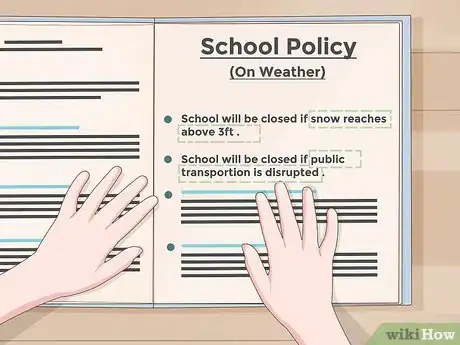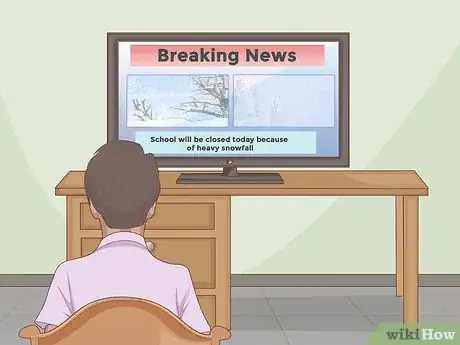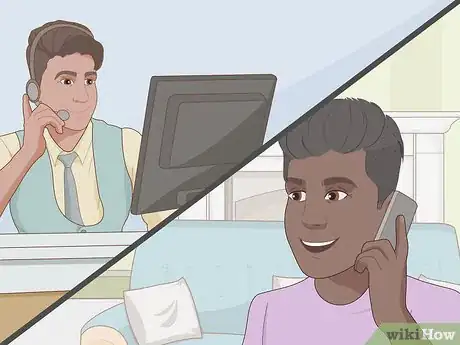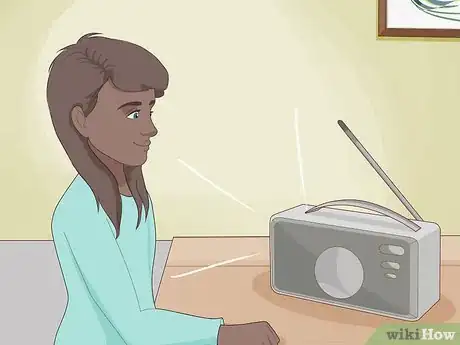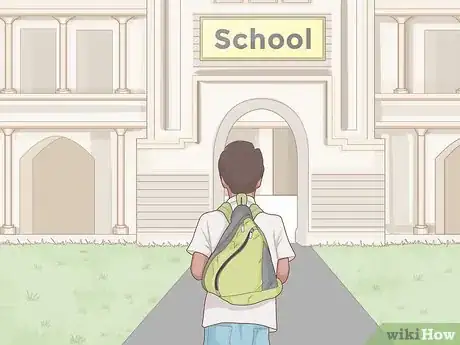This article was co-authored by wikiHow Staff. Our trained team of editors and researchers validate articles for accuracy and comprehensiveness. wikiHow's Content Management Team carefully monitors the work from our editorial staff to ensure that each article is backed by trusted research and meets our high quality standards.
This article has been viewed 343,043 times.
Learn more...
Sometimes inclement weather, such as heavy snow and ice, can be so dangerous that schools close early or are cancelled for the entire day. Your school considers inclement weather as they schedule the school year. Every school is responsible for the safety of its students and won’t jeopardize anyone. If school is closed, your school wants you to know that.
Steps
Preparing the Night Before
-
1Check the weather. The weather forecast for tomorrow won’t always give you an accurate prediction, but it will give you an idea. Check online or dial into your local news station to see tomorrow’s forecast. Look at the percentage prediction of snow. If the forecast calls for over an 80% chance, or shows a weather warning, then the chances are high.
- You should also take a look at the hourly forecast for tomorrow. See if the precipitation is suppose to increase or decrease as the day progresses.
- Make sure any snow-related news reports you find are from reliable sources, such as national weather services and trustworthy news sites. Weather reports published in tabloids are often exaggerated and sometimes even fake.
-
2Check your school’s hotline. Parents and students may be able to call a number provided by the school to find out information on school delays or cancellations. Since it comes from your school directly, this is the most reliable way to obtain information. Most schools are equipped with such a system, but check to be sure before the next big weather problem hits.[1]
- You may also check the school's website, if it has one, for a delay/cancellation notice. Many websites will list this information clearly on the front page.
- If your school has a social media account (such as Twitter or Instagram), check that too. They might have posted updates on whether or not school is cancelled.[2]
Advertisement -
3Know your school's weather policies. The best way to plan ahead is to review your school's policies on inclement weather. Review your school's handbook or website for any information on your school's rules for weather. If a school is prepared, they will have this documented for parents and students.
- For example, a school might close without question if snow reaches above three feet. School could be cancelled if the power is out in the school or neighboring communities.[3]
- Another common policy is to cancel or delay school if public transportation is disrupted.
-
4Go to bed as you normally would. This means having all your homework done and packed away as it normally would be. You should also mentally expect school to be open the next day. Several snow day predictions have been wrong. You don't want to wake up to disappointment or panic because you haven't studied for your math test!
- If school is cancelled, then you are in for a surprise! It makes the fun even better. Even if it's not cancelled, you can do your research and be the first to know about the next big snowstorm to hit your town!
Checking the Morning Before School
-
1Check your local news. As soon as you wake up, check the news affiliate's website for school delays and cancellations. They should have an accurate list that will normally be refreshed every few minutes for updated information.[4]
- You could alternatively turn on the local news. Near the bottom of the screen they’ll show school cancellations and delays based off county districts.[5]
- If you attend a private school, your school information may not be listed on the news.
- Check this site for information: http://www.cancellations.com/
-
2Check with your school. Many schools will send out an automated phone call or email to all student’s homes. If your school does not do this, you can call the school directly or go to its website. Your school should have a inclement weather hotline you can refer to.[6]
-
3Ask your peers. If you’re not able to get a clear answer, call a friend and ask them if they know any information. Do not call them too early in the morning.
- Make sure you can trust your friend. It’d be unfortunate for you to find out school’s cancelled when it isn’t.
-
4Listen to a local radio station. Some local radio stations include delay and cancellation information for schools. Survey through your stations until you get the local news station. You probably won’t hear about school delays from your classic rock station.[7]
-
5Go to school. If all else fails, get ready and go to school like you would on a normal day. If the parking lot is empty, the doors are locked etc, then school is most likely closed. Even if your school is open, there is always a chance that you will be sent home early due to inclement weather.
- If you weren’t able to get a clear answer, your school is probably open as usual.
Warnings
- If you decide not to go to school, make sure it is cancelled first.⧼thumbs_response⧽
- News and radio presenters do not always read out an organized, alphabetical list of school cancellations. It would be best to check online.⧼thumbs_response⧽
References
- ↑ http://www.lancaster.k12.oh.us/News/24462#sthash.FJudkJSd.dpbs
- ↑ https://www.madison.k12.wi.us/weather
- ↑ https://www.weather.gov/media/aly/School%20Weather%20Safety%20Plan.pdf
- ↑ https://www.madison.k12.wi.us/weather
- ↑ http://www.hcpss.org/schools/emergency-closings/
- ↑ http://www.lancaster.k12.oh.us/News/24462#sthash.FJudkJSd.dpbs
- ↑ http://www.hcpss.org/schools/emergency-closings/
